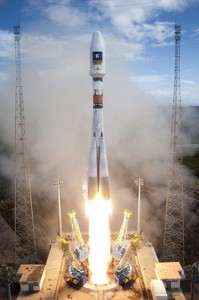In an effort to offset the launch setbacks in 2014, the European Space Agency (ESA) has announced that they will be launching three pairs of satellites into orbit in 2015, essentially doubling the current constellation. Official dates and timelines for the launches are expected to be announced sometime next week.
Surprisingly, the satellites will be put into orbit by Ariane 5 and Soyuz carrier rockets created by Russia. The Soyuz rocket, you might recall, was the same model that malfunctioned during a launch last year and stranded two constellations in the wrong orbit. The malfunction was the result of a design flaw that caused pipes to freeze during a critical stage and has, I hope, been corrected.
The Galileo system is expected to be completed by around 2020 and will be the world’s first commercially owned satellite navigation system. With improved accuracy over GLONASS and GPS, the Galileo satellites are expected to be used not only for commercial and consumer navigation, but also search and rescue operations.
With the addition of these six satellites, Galileo will have a total of 12 satellites in orbit, only a few shy of being able to enter the Initial Operational Capability (IOC) phase, which requires 18 total satellites. The IOC phase will likely be reached in 2016, only a year behind the original schedule. This phase will provide open service as well as basic search and rescue operations.

